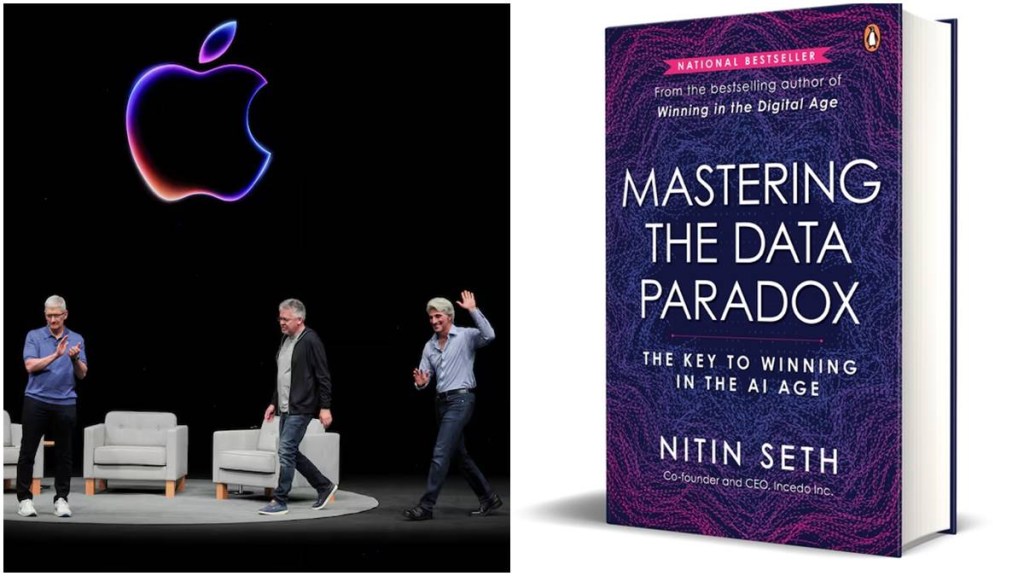By Radhika Roy
Most tech enthusiasts, and a majority of die-hard Apple fans, wait with bated breath for the annual Worldwide Developers Conference (WWDC) in California where Apple announces the myriad of magic tricks it has been working on. Ranging from new devices to new features, the WWDC is the tech event of the year with Apple showcasing how it tests the limits of technology. And this year, Apple proved its mettle once again by unveiling its personal artificial intelligence (AI) system—Apple Intelligence.
Apple is not the only company harnessing the power of AI. Google and Microsoft have also announced their plans to unleash a suite of AI-powered services. But, what lies at the core of the functionality of AI and drives its usability, is data. It is the lifeblood of AI, and this data is manufactured not just by machines, but by users who are people, like you and me. Nitin Seth, the author of Mastering the Data Paradox: The Key to Winning in the AI Age, calling our age the “data-first world”, has recognised this value of data and penned a playbook for organisations looking to master it.
Seth, the co-founder and CEO of Incedo, is a tech entrepreneur who prides himself on being ahead of the curve when it comes to adopting data as a source of knowledge. Having worked at McKinsey and Flipkart, Seth has witnessed the exponential growth of digital technologies, which is then harnessed by companies that recognise data’s important role in this growth. Armed with these invaluable learnings and experiences, Seth has constructed a framework for future adopters, both enterprises and individuals, of data and its unlimited possibilities in the age of AI.
The book is divided into three sections, with Section I focusing on understanding the very concept of data to comprehend why it is important in this day and age. Section I consists of five chapters where Seth painstakingly takes the reader through the genesis of data, its evolution into fuel for the digital age, and into how its transformational nature can allow entities to maximise their value. To showcase how our way of living has been revolutionised with the help of data, Seth relies on examples ranging from usage of GPS to entertainment via over-the-top (OTT) platforms such as Netflix to cashless transactions and simplified banking processes; all functions that have arisen with realisation of the importance of data.
Here, however, Seth uncovers the potential and the paradox of data. While companies have grasped that data is the key to their advancement, they fail to address the challenges that the abundance of data brings—an inability to convert it into actionable insights. As Seth quotes from Samuel Taylor Coleridge’s The Rime of the Ancient Mariner, “water, water everywhere, nor any drop to drink”, thus summing up the predicament that data brings forth.
To tackle this predicament, Seth dissects the data management value chain by explaining to the reader how Data’s value can be generated from Insights that are cultivated at every stage of the chain, and how these insights can ultimately be used to take decisions or Action and create the desired Impact (DIAI framework). This leads the reader to Section II of the book where Seth presents a 13-component Unified Solution Framework (USF) to address the root cause of their problems and avoid being caught in the Data Paradox.
The components of the USF are elaborately defined. As readers, we are taught how to integrate multiple internal data sources and approach data logically based on use case, instead of a traditional physical approach. We are also exposed to the profitability of real-time data that can then be used to personalise customer services and rectify issues immediately. The book also highlights the importance of data quality, using the example of a 2008 Google project, Google Flu Trends, that churned up incorrect real-time insights because of its flawed algorithm that could not distinguish between a search for actual illness and a search driven by curiousity.
Seth also highlights data democratisation, which involves fostering data literacy and expanding the accessibility of data to all employees, regardless of their expertise. He states that such democratisation is necessary for a holistic approach to decision-making and can be encouraged with the help of user-friendly business intelligence (BI) tools. The book then shifts to data security which is necessitated by data democratisation. Recognising the mounting threats to cyber security as well as developing data protection legislation, the book advocates for a context-driven zero-trust security framework.
In Section III of the book, Seth addresses the data paradox for individuals. He moves away from the world of management and explores what a data-first world means for a person. Even as he conflates an individual with an organisation, and places the value of data-driven decision-making over the value of intuition, this does not mean one should discard their hard-earned wisdom for a few data points. The book also dives into data privacy concerns that emerge on account of living in the digital age and how such critical issues require immediate redressal. Most importantly, Seth touches upon how constant digital engagement can negatively impact one’s mental health, and he lays down a few suggestions that can help individuals ground themselves, such as taking up meditation and physical activities.
Replete with examples and anecdotes, the book engages the reader despite dealing with a niche topic. The language is accessible to readers of different backgrounds as Seth masterfully describes technical terms pertaining to both technology and management. The book, though mammoth in its size as well as the information it relays, can be breezily consumed and enjoyed by individuals who may not constitute its target audience.
Nitin Seth’s Mastering the Data Paradox serves as a valuable resource for any individual seeking to delve into the transformative potential of data in the modern world. The advice given in the book is practical and grounded in real-world applications, not only providing a roadmap for organisations that are keen on exacting profitable business outcomes from a sea of data but also for individuals who find themselves lost in this sea.
Radhika Roy is a lawyer based in Delhi, working on technology policy and digital rights








